Readers, to your marks!
Welcome back to ILTBTA! This time around, we watched the British running drama Chariots of Fire.
Get set!
Prepare yourselves for exactly zero chariots and zero fire.
(*starting gun fires*)
Read!
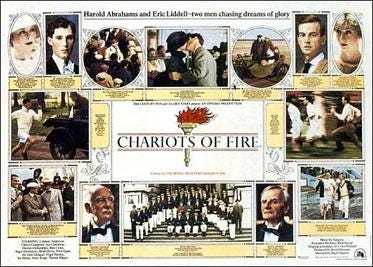
Previews
What, if anything, did we know about this coming attraction before we watched it?
Ellen: I didn’t know this movie existed.
Tyler: For the longest time I got this mixed up with Ben-Hur because of the epic chariot race scene in that movie. Then once I realized they were two separate movies, I again incorrectly thought this was another Roman chariot movie. Imagine my surprise when I found out it was neither!
Plots & Feelings
This one’s pretty self-explanatory.
Short Version (courtesy of IMDb): Two British track athletes, one a determined Jew and the other a devout Christian, are driven to win in the 1924 Olympics as they wrestle with issues of pride and conscience.
Long Version (modified from Wikipedia and formatted to fit your screen):
We begin at the end for Harold Abrahams, with the camera panning over the congregation at his funeral service in 1978. Lord Andrew Lindsay beckons us back in time to a group of young men running on the beach, preparing for the 1924 Olympic Games in Paris. Voiceover correspondence of a letter from one of the young men, Aubrey Montague, to his parents, takes us into yet another flashback: 1919 at the University of Cambridge.
Ellen: The song accompanying this run on the beach was the musical equivalent of “that guy from that thing!” You’ll read more about this iconic theme in Wiki-Wiki-Whaaat?, but I was surprised to hear it pop up!
Tyler: I literally wrote in my notes “Oooooh that inspirational music is from this movie.” It’s somewhat jarring to have the most memorable song from a movie be in the opening and (spoiler) the very end, I feel like you don’t see that very often.
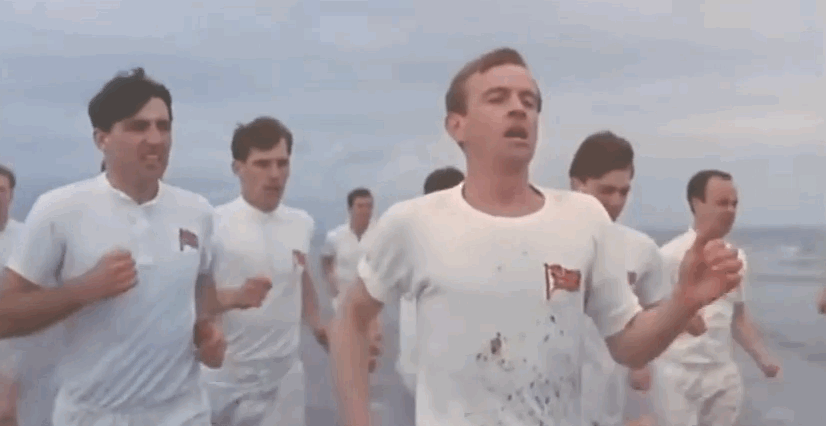
Young Harold Abrahams shares a cab with Aubrey, and the two become friends. Despite dealing with some antisemitism (and on top of that, having to explain the concept of casual bigotry to Aubrey), Harold begins getting involved at the university. He joins the Gilbert and Sullivan club, and even makes an attempt at the Trinity Great Court Run. What’s that you ask? As a kid wearing the dumbest hat you’ve ever seen explains, it requires running the perimeter of the courtyard in the time it takes for the clock to strike 12, and in 700 years, no one has yet managed it. Young men line the route1, eagerly awaiting the start, when Andrew decides to try as well. With the white-haired deans looking on from above, Harold and Andrew sprint their hearts out, and Harold does it!
Ellen: I thought this challenge might be like climbing the pole in Mulan, but nope - he just knocks it out on the first try. This was small potatoes, and Harold had bigger fish to fry. Great, now I’m hungry!
Tyler: I could squeeze this into WWW, but The Great Court Run is a real thing, though there is not a record of Abrahams running it. At the time of filming, the only person known to have succeeded was Lord Burghley, who the character of Andrew Lindsay is based on.
Also Tyler: Now that that fun fact is out of the way … I found the immediate post-WWI setting to be an interesting one that I feel you don’t see very often in movies. The speech given at their welcome dinner commemorating the fallen Cambridge students was particularly moving, with “And now by tragic necessity their dreams have become yours” sticking with me.

If it wasn’t clear from him breaking a centuries-old record, this kid is fast. Harold demolishes the competition in race after race, even at the national level. He also manages to find time for a love life! He and the boys attend a Gilbert and Sullivan performance, and he’s very taken with lead soprano Sybil Gordon. Luckily for him, Sybil’s younger brother is very taken with Harold’s athletic prowess, so she agrees to a date. Despite a near miss with some pig trotters at dinner, the two begin a relationship.
Meanwhile in Scotland, rugby player and aspiring reverend Eric Liddell is branching out into racing. While his sister Jennie doesn’t approve, others in Eric’s community see the value in a muscular Christian2 winning race after race in the Lord’s name. Eric uses every opportunity to preach to those who have come to see him race, but he’s also feeling the pull back toward missionary work in China, where he was born.
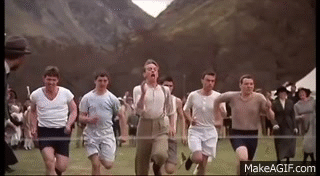
Harold and Eric are on, shall we say, parallel tracks, until they finally compete against one another! Eric wins, and Harold shows us one of the most realistic depictions of ruminating on a failure that this author has ever seen. Sybil makes him snap out of it, and Harold manages to retain the services of renowned coach Sam Mussabini to help refine his technique. The Cambridge powers that be are none too pleased about an amateur employing a professional coach, and Harold interprets this as cover for antisemitic and classist prejudice. All of this builds up over years to Harold, Eric, Aubrey, Andrew, and others representing Great Britain in the 1924 Olympics in Paris.
Ellen: The best part of the pre-race training montage is Andrew at his country estate, balancing a coupe of champagne on every hurdle and instructing his butler to inform him of any drops spilled. Top tier rich kid antics, well done!
Tyler: The second best part is Sybil roasting Harold when he says he doesn’t know what to do. “Try growing up” is a savage response that, honestly, a lot of these pampered rich kids could probably stand to hear!
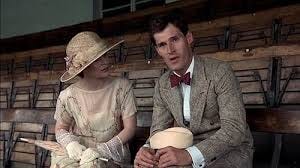
“Rich White man says what?” (Source)
The team boards the boat to France, and it’s only as they’re departing that Eric learns that his 100-meter qualifier race will be on Sunday! Eric is very against the idea of competing on the Lord’s Day, and this worry festers into the start of the games. The British Olympic Committee and the Prince of Wales begin pressuring him to compromise his beliefs. Andrew comes in clutch and gives Eric his spot in the 400 meter race on Thursday, because he’s already won a silver in 400 meter hurdles. Eric’s religious convictions make international news.
Ellen: It’s all well and good that they found a solution to Eric’s plight, but I can’t help but wonder if they’d be quite as accommodating to Harold if his qualifier had been on a Saturday.
Tyler: I think the answer you’re looking for is “no.”
Meanwhile, Harold is badly beaten by one of the heavily-favored United States runners in the 200 meter race. His confidence is once again shaken, and he delivers a somewhat tone-deaf monologue to Aubrey about the pressures of being someone who strives for greatness, whereas Aubrey is just “content.” Coach Sam has been barred from the stadium, but gives Harold a charm to wear. Harold lines up against the Americans for the 100 meter race, and he wins! He and Sam celebrate late into the night at Cafe Extra, and Sam encourages Harold to get on with his life now.

Just one race to go for the Brits! Jennie has deigned to come watch her brother compete on the world stage. Eric warms up and preps his part of the track. While the US coach remarks to his runners that Eric doesn’t really stand a chance at this longer race, one of the American runners hands Eric a note of support that quotes 1 Samuel 2:303. Eric runs his heart out for a quarter of a mile, and he takes the gold!
Ellen: Eric says he can feel God’s pleasure when he runs. I’d say when I run I feel more of a reminder that He loves all his creatures, fast and quite, quite slow lol.
Tyler: Hey at least you don’t look like Eric when you run … anyway, kudos to this movie and story because I had no idea what was going to happen in the third act.
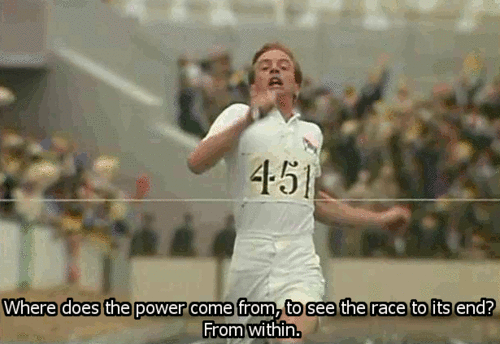
We return, finally, to Harold’s funeral in 1978. Text on the screen informs us that Harold married Sybil and became the elder statesman of British athletics. Eric was true to his word and returned to China, and all of Scotland mourned his eventual death.
Intermission
Even though ILTBTA is free, please indulge us further and enjoy this quick “advertisement.”
This installment of ILTBTA is brought to you by … running away from your problems!
Life’s tough, and you know what’s tougher? Actually dealing with it. And really, who wants to do that? So instead, why don’t you try: running away from your problems! Instead of puzzling over your personal finances, relationships, or even the state of the world, just lace up those spikes and fly away from it all.
Get fit and don’t deal with it, guaranteed!
Caution: when used inappropriately, running away from your problems may cause increased anxiety, increased severity of problems, deterioration of relationships, deterioration of joints, and other side effects. Consult your doctor before running away from your problems, and please don’t tell them ILTBA told you to.
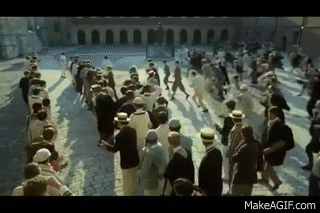
Wiki-Wiki-Whaaat?
Love a good Wikipedia rabbit hole in search of some fun facts? Us too.
Chariots of Fire’s Wikipedia page has some interesting facts and anecdotes that we recommend you read through, but here are a few of our favorites:
The title of the film is in reference to the biblical phrase “chariot of fire” from 2 Kings 2:11 and 6:17. It was popularized by the William Blake poem and unofficial English anthem “Jerusalem,” which features the line “Bring me my chariot of fire!” and is played at the end of the film.
The film’s Wikipedia page notes that the producers intended to make a movie that was “historically authentic, (but) not intended to be historically accurate.” As such, there’s a laundry list of liberties taken with respect to people, timelines, and scenes that are honestly too numerous to list here, but are worth reading through if you’re interested in the actual history.
Tyler: I typically dock points for movies with a lot of historical inaccuracies (Just tell us what actually happened! History is interesting!), but in Chariots’ defense a few of these are because some people straight-up didn’t want their name/image/likeness included at all, which complicates things. Also, the champagne hurdle flourish was better than reality.
Something that was largely kept historically accurate, though, were the letters from Aubrey Montague home to his parents, which served as a narrative bridge throughout the film. Montague’s son saw an ad placed by screenwriter Colin Welland for any memories related to the 1924 Olympics and responded with copies of the letters.
Perhaps the most long-lasting impact of Chariots of Fire is the “Chariots of Fire” song (dun-dun-dun-dun-DUN-DUN, dun-dun-dun-dun-DUN-DUN over synths; you’ve heard it), which made it to #1 on the Billboard Hot 100 list in May 1982. The song helped Greek composer Vangelis win the Oscar for Best Original Score.
The song was almost not created at all. Director Hugh Hudson originally wanted a different Vangelis song to play during that scene, even going as far as blasting that other song from loudspeakers while filming the scene. Vangelis, though, was convinced he could improve upon his earlier work and created the now-iconic theme towards the end of production.
Accomplished theatre actor Ian Charleson, who played the devoutly Christian Eric Liddell, had a supporting role in future ILTBTA post Gandhi, which won the Oscar for Best Picture the year after Chariots of Fire. Sadly, Charleson died of AIDS at the age of 40. Prior to his death, he requested that his true cause of death be publicized to spread awareness and acceptance of the disease.
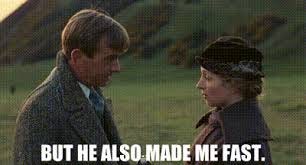
Charleson wrote the post-race speech at the Scotland vs. Ireland races himself. He told the director and screenwriter he found the original scripted speech inauthentic and not inspiring.
Tyler: What a savage move on Charleson’s part to be like “Hey this thing you wrote for me is utter garbage, I bet I could do better.” And, to his credit, he (probably) did! I have to imagine there’s more to this story, though.
You may recognize Ben Cross, who played the Jewish runner Harold Abrahams, as Spock’s father Sarek from the 2009 movie Star Trek. He attracted attention for the role of Abrahams for his work as Billy Flynn in a West End production of Chicago.
All of the indoor scenes set at Cambridge were actually shot at Eton College (director Hugh Hudson’s alma mater) because Cambridge refused filming rights for fear of being viewed as anti-semitic.
Ellen: Well, Cambridge: were you?
A scene in the beginning of the movie set at the train station near Cambridge, in which Abrahams and Montague arrive and are greeted by two facially-scarred WWI veterans who ultimately use an obscenity, was included to gain a PG rating. The filmmakers were apparently afraid that having a G rating in the U.S. would negatively impact box office sales.
Tyler: I learned from the Chariots of Fire episode of our favorite movie podcast, Unspooled, that returning soldiers from WWI inspired a lot of monster movies because of how then-modern medicine was able to keep veterans alive but often with previously unseen contraptions, scarring, or missing limbs. One of those “cruel but nevertheless interesting” facts that will probably stick in my head for a while.
And, finally, you know we couldn’t make it through a Wiki-Wiki-Whaaat for a British movie without a Harry Potter reference: the head porter at Caius College that greets Montague and Abrahams is played by Richard Griffiths, who is best known (by us, at least) for playing Harry’s uncle Vernon Dursley.
Tyler: Kudos to you, Ellen: you clocked this one pretty much right away!
Oscar NomNomNomz
Since we all know a movie is nothing without the food and drink it incorporates.
It’s now time to award the Oscar for Best Snacktor in a Supporting Role4. And the nomnomnominees are:
A secret cocktail while on a date with someone you just met
Pig’s trotters on said blind date
A few drops of champagne that dripped from your bougie hurdles practice
A celebratory glass of cognac at Cafe Extra after winning a gold medal
And the Oscar goes to … the few drops of champagne from your hurdles practice! Unfortunately, Ellen drank the champagne whilst celebrating her completion of the Cherry Blossom 10-Miler, so I (Tyler) will accept this award on its behalf.
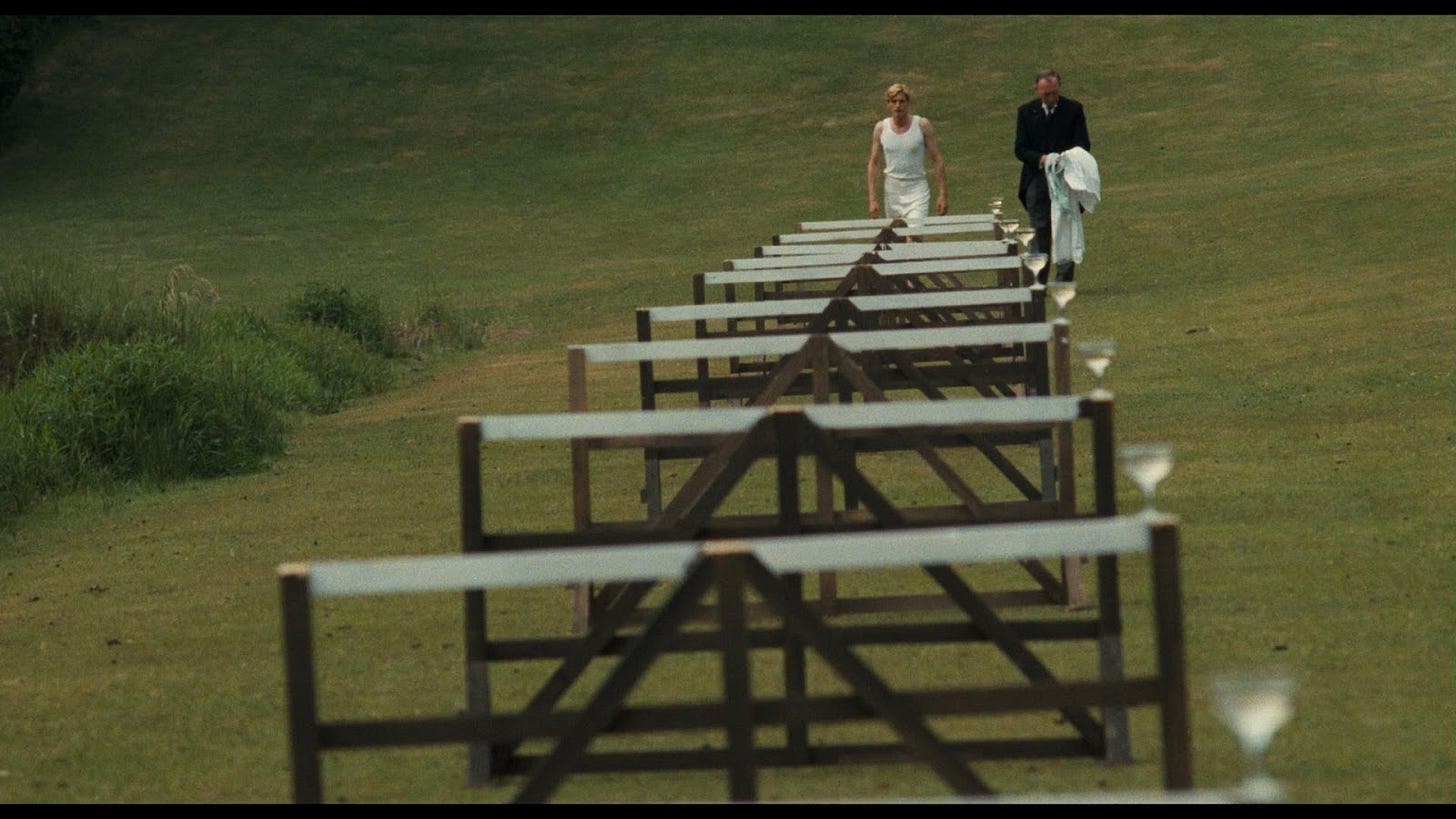
Fill In The Blank
How did we really feel about The Academy nominating this?
Ellen: I’d like to order my favorite off-menu special The Academy, and it will unfortunately turn out to be something they can’t eat. I’m actually kind of torn about this. This movie does not execute drama in the way of an American sports movie, but as Tyler says below, there’s an undercurrent of angst and melodrama that’s very present. The lack of blatant antisemitism doesn’t make Harold’s struggles any less real, and the cold microaggressions of “polite” society are probably pretty accurate, but it gives the audience little to grab onto. On the other hand, if Eric had been a fiery Bible-thumper, his devotion may have come across quite differently (which is to say: badly!). One thing I can unflinchingly say I loved: it does those of us who run ugly proud, and for that, I salute it!
Tyler: I’d like to politely clap for The Academy at the Olympics but loudly root for the Americans in the race. I very much see what Chariots of Fire was trying to say and I think it’s a really interesting story, but the emotional beats just didn’t quite hit for me. The extremely British style of angst and melodrama was reminiscent of A Room With A View (in a bad way!) and just felt very … unemotional? Performative? Like, the acting was fine, but I needed more “show don’t tell.” It seemed to use slo-mo and voiceovers as a crutch to tell us something was important, as opposed to having the actor/plot show us. It also seemed like it didn’t know what to do with the character of Montague: use him as the audience stand-in and narrative throughline with his letters, or relegate him to the background. I literally forgot about him for most of the movie.
The final races both fell kind of flat for me from a movie-making perspective. For Abrahams’ in particular, I know you’re trying to emphasize how quick it goes by, but the single-shot from behind the finish line just zapped all of the emotional juice from the climax you just spent two hours building up to. Is the movie trying to say that the race is actually the important thing and that his overall devotion (to his faith and running) matters more? Probably, but that doesn’t mean I have to like it. Perhaps my American sensibilities are too strong, but I could’ve done with little more heart or passion or something-to-make-me-care-about-these-rich-talented-men-who-God-forbid-are-facing-problems-in-their-lives.
All of those negatives notwithstanding, I still thought it was an overall pretty good movie! The religious conviction angle of the plot feels pretty wholly unique for what is essentially a sports movie, and damn do those synths slap.
Let The Credits Roll
Thanks for reading! Some quick housekeeping as you exit the theatre:
If you have plots and feelings of your own (on the movie or ILTBTA in general), feel free to comment on the post or simply reply to the email. If you liked reading this: tell your friends! If you hated reading this: tell your friends how much you hated it by forwarding it to them!
ILTBTA is on Letterboxd, the social networking/movie review site for movie fans. Follow us there to read our Spreadsheet comments of our ILTBTA movies, plus our ratings of other movies we watch!
If you’d like to start a wild Best Picture journey of your own, feel free to download a copy of The Spreadsheet. Bonus: checking off the boxes is oddly satisfying.
Post-Credits Scene
Get a sneak peek at the next ILTBTA installment.
If you liked “the British are running,” then you’ll love the next installment of ILBTA, where we’ll be covering the 1966 dark comedy The Russians are Coming, The Russians are Coming! Starring Alan Arkin and Paul Reiner, this film tells the tale of a Russian submarine crew that accidentally runs aground in New England, and the locals are not pleased. The Russians are Coming is available on Prime Video or to rent from all the usual suspects.
Until then, don’t forget to stretch!
Sounds like my ex-wife!
Same.
The relevant part of the verse being “Those who honor me, I will honor.”
Results tabulated and certified by the accountants at Ernst & Yum™.




